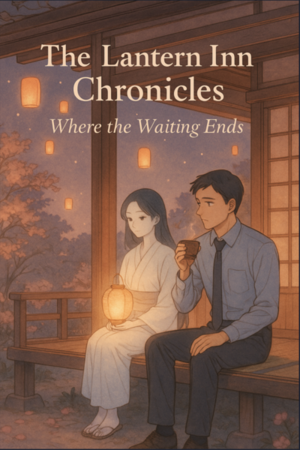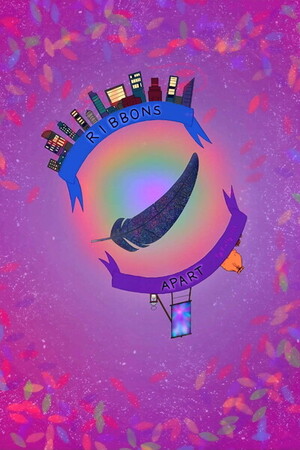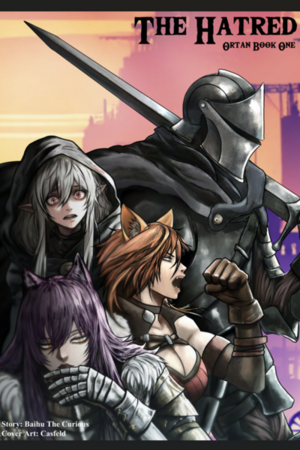Chapter 7:
The Man Who Wasn’t Saved
Lantern Inn Chronicles
It rained that morning.
Not the sharp, hurried drizzle of Tokyo, where umbrellas clashed and puddles turned into reflections of neon signs. No, this was a different kind of rain — a soft, relentless weeping from the sky. As if the clouds weren’t crying at something, but for something — something long gone and still unspoken.
Kaito sat on the porch of the inn, a cup of lukewarm tea forgotten in his hands. The mist rolled through the pine-covered hills like breath from a sleeping giant. Everything around him felt slow, still, and sacred — like even the earth was caught in the act of remembering.
Behind him, the inn creaked gently, old wood shifting like it had stories of its own. Then, a voice.
“There’s someone at the riverbank.”
It was Rin, holding an umbrella too small for two. Her voice, always calm, had a tremor beneath it this time — the kind that didn’t come from fear, but from something older.
“He’s been standing there since dawn,” she added, not meeting Kaito’s eyes. “He doesn’t speak. Doesn’t move.”
Kaito followed her gaze past the veranda, down the stone path that curved through the fog like an old scar. And there — at the edge of the river where the mist met the water — stood a man.
Tall, with shoulders slumped as if beneath invisible weight. His coat was soaked through, clinging to his back like grief. His hair hung in dripping strands, unmoving in the breeze. And yet, despite the downpour, he didn’t shiver.
“Another soul?” Kaito asked softly.
Rin was quiet for a long moment before answering. “No,” she said. “A shadow.”
The word landed heavily between them.
They went together, silent except for the soft rustle of wet leaves and the gentle tap of rain against the umbrella. With each step, Kaito felt it — a tightening in his chest, a pressure that wasn’t fear or even sorrow.
It was guilt.
Raw. Familiar. Heavy.
As they approached, the man turned slowly, as if pulled by a force he didn’t trust.
His face was ordinary. No scars. No signs of trauma. Just blank — like a page that had once been full and had been scrubbed too clean. But his eyes…
His eyes were hollow. Not empty — worse. They looked used up. Like whatever had once burned behind them had long since turned to ash.
Kaito flinched. Because in those eyes, he saw something horrifyingly familiar.
He saw himself.
Not his face, not exactly. But a version of his own soul, mirrored back.
“I didn’t save him,” the man said, voice low and almost lost to the rain.
His words seemed to come not from his mouth, but from somewhere deeper — like he was leaking the truth rather than speaking it.
“He cried, and I walked away.”
Behind him, the river stirred. Just for a breath, the surface shimmered like the floor of a Tokyo subway — flashes of silver rails, harsh fluorescent light, a child’s reflection in a passing window — then vanished. Just water again.
Kaito’s hands curled into fists at his side. But he said nothing.
“He was twelve,” the man continued, as if reciting a memory he’d rehearsed too many times. “My brother. Got into a fight at school. Came home with a cut on his lip and tears in his eyes. Said he wanted to disappear. I told him I was busy.”
His jaw clenched.
“The next day… he jumped.”
Each word struck like a stone breaking still water — rippling outward, shaking loose things buried for too long.
Kaito’s legs gave out. He sank to his knees beside the man without even realizing. Rain soaked through his sleeves, chilled his skin, but he didn’t feel it. All he could feel was the weight in the man’s voice — a sorrow so deeply worn it had become part of his posture, his presence, his shadow.
The man’s voice turned quieter, but not softer.
“I thought if I just kept going… breathing, working, eating, sleeping — even if none of it felt real — maybe I could make up for it. That just existing was enough.”
He let out a breath like someone exhaling years.
“Like maybe if I kept hurting, I was doing something for him. Like pain could be penance. Like regret had weight, and carrying it made me worthy.”
His hands tightened into fists again. His knuckles pale against the dim sky.
“But pain doesn’t redeem you,” he whispered. “Not if you never face it. Not if you use it to hide instead of heal. I just dragged it with me. Like old luggage I never unpacked. Like ballast — heavy enough to keep me from drifting, but not enough to help me float.”
Kaito stared at the water, chest tight.
And then — without knowing why, without deciding — the words spilled from him.
“My sister,” he said, voice cracking.
The man looked at him, but didn’t interrupt.
“She asked for help once. Not in words, but… she didn’t have to. I knew. Our parents made all her choices. Her degree, her future, even her friends. And I…”
His voice trembled.
“I told her to endure it. I said maybe it was okay. Maybe they knew better. That it would pass.”
He stared at his own hands.
“She stopped talking to me after the funeral. I didn’t try to find her. I told myself she was better off. But really, I just didn’t know how to look her in the eyes anymore.”
He let the words sit there.
The man turned toward him fully. His gaze was no longer distant — it was direct. Not like a stranger, not like a ghost, but like someone standing across a mirror.
“And your mentor?” he asked, quietly.
Kaito’s throat tightened. He nodded slowly, his voice barely a breath.
“I never told him either. Not once.”
He swallowed hard.
“He was the only one who saw me when I first joined the firm. Called me by my name when no one else bothered to. Everyone else just said, ‘Hey,’ or didn’t look at me at all. But Tanaka-san… he believed in me before I even knew who I was.”
He paused.
“I thought I’d have time to thank him. After his retirement. After mine, maybe. But the pandemic came. And then…”
He stopped. Couldn’t finish.
The river moved. The current deepened. Kaito felt it tugging — not at his clothes, not at his skin, but somewhere inside. Somewhere old.
“I think…” he whispered, “some people don’t get saved.”
The rain around them softened. The rhythm changed. Not gone — but gentler. As if the sky were listening.
“But memories…” Kaito said slowly, “maybe they can still be mourned properly. Even if the person is gone. Even if we were too late.”
The man’s shoulders, once braced against a storm long passed, seemed to slacken — just slightly.
His breath shook as he exhaled.
“Do you think that’s enough?” he asked.
Kaito didn’t answer right away. He looked up, past the river, past the trees, to the sky overhead — thick with clouds, but no longer hostile.
“No,” he said, honestly. “But… I think it’s a start.”
The man met his gaze one last time. No words passed between them.
And then he was gone.
Not in a dramatic gust, not in a burst of light — just… absent. Like fog lifting. Like a question that no longer needed to be asked.
The river rolled on.
Rin found Kaito there later, still kneeling by the edge, soaked through, unmoving. He didn’t look up when she approached. Didn’t need to.
“You saw him,” she said gently.
He nodded.
“He was me,” Kaito whispered. “Or… the version of me that never made it here. The one who just kept walking, never looked back. Never said anything.”
Rin said nothing. The silence settled, soft as moss.
“There are many like him,” she said eventually. “Some drift. Some haunt. Most stay silent. Few are heard. Fewer still are understood.”
Kaito’s eyes remained on the water.
“I thought forgetting made it easier,” he murmured. “That letting go meant never touching it again. But all it did was make the echoes louder. Like shouting into a canyon. Like silence trying to answer silence.”
Rin nodded, faintly. “Some echoes just want to be remembered.”
They walked back up the hill slowly, without speaking.
That night, after the lanterns were dimmed and the hallways were quiet, Kaito sat alone in his room. The paper screens slid shut, the fireflies outside pulsed gently. The wind chimes above the eaves played a soft, uneven lullaby.
He reached into his satchel — the only thing he’d carried from his past life — and took out a frayed, timeworn handkerchief.
White cotton, barely holding its shape.
A crooked blue “K” stitched clumsily in one corner.
His sister had made it for him, long ago. When she still saw him as someone who could protect her.
He ran his fingers along the thread. The embroidery had loosened over the years, but it held.
He pressed the cloth to his chest.
And, for the first time in a very long time, he wept.
Not from despair.
But from something quieter. Older.
A sorrow that no longer needed to be hidden.
A wound finally clean enough to begin healing.
And in that slow, honest release — as tears soaked the threads his sister had sewn — something inside him exhaled.
And that, too, was a beginning.




Please sign in to leave a comment.